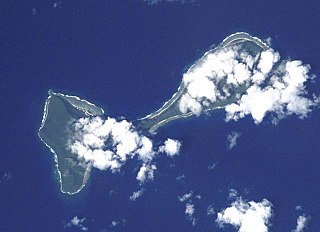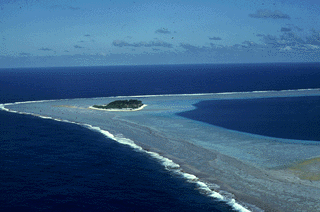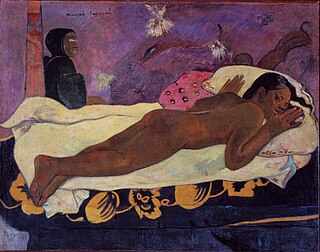Related Research Articles

In Norse mythology, Kvasir was a being born of the saliva of the Æsir and the Vanir, two groups of gods. Extremely wise, Kvasir traveled far and wide, teaching and spreading knowledge. This continued until the dwarfs Fjalar and Galar killed Kvasir and drained him of his blood. The two mixed his blood with honey, resulting in the Mead of Poetry, a mead which imbues the drinker with skaldship and wisdom, and the spread of which eventually resulted in the introduction of poetry to mankind.

The Polynesian narrative or Polynesian mythology encompasses the oral traditions of the people of Polynesia, a grouping of Central and South Pacific Ocean island archipelagos in the Polynesian Triangle together with the scattered cultures known as the Polynesian outliers. Polynesians speak languages that descend from a language reconstructed as Proto-Polynesian that was probably spoken in the Tonga - Samoa area around 1000 BC.
Māui (Maui) is the great culture hero and trickster in Polynesian mythology. Very rarely was Maui actually worshipped, being less of a deity and more of a folk hero. His origins vary from culture to culture, but many of his main exploits remain relatively similar.

In Māori mythology, Tangaroa is one of the great gods, the god of the fish. He is a son of Ranginui and Papatūānuku, Sky and Earth. After he joins his brothers Rongo, Tūmatauenga, Haumia, and Tāne in the forcible separation of their parents, he is attacked by his brother Tāwhirimātea, the god of storms, and forced to hide in the sea. Tangaroa is the father of many sea creatures. Tangaroa's son, Punga, has two children, Ikatere, the ancestor of fish, and Tū-te-wehiwehi, the ancestor of reptiles. Terrified by Tāwhirimātea's onslaught, the fish seek shelter in the sea, and the reptiles in the forests. Ever since, Tangaroa has held a grudge with Tāne, the god of forests, because he offers refuge to his runaway children.
Samoan mythology tells stories of many different deities. There were deities of the forest, the seas, rain, harvest, villages, and war. There were two types of deities, atua, who had non-human origins, and aitu, who were of human origin.
In Samoan mythology, Tagaloa is generally accepted as the supreme ruler, the creator of the universe, the chief of all gods and the progenitor of other gods and humans. Tagaloa dwelt in space and made the Heavens (lagi), the sky, the land, the seas, the fresh water, the trees and the people. Samoans believed Tagaloa created nine heavens. After Tagaloa made the islands, the humans developed from worms.

In Polynesian mythology, stories about Tinirau are found throughout the islands of Polynesia. He is a guardian of fish. Many themes recur in the various versions. Often he travels to another land in search of his wife, or his wife travels to another land in search of him; sometimes he treats his wife badly, or she rejects him; while he is guardian of fish, it is his wife who gives the fish their individual characteristics. Sometimes their anxious or jealous relatives try to separate the lovers.
Samoan is the language of the Samoan Islands, comprising Samoa and the United States territory of American Samoa. It is an official language, alongside English, in both jurisdictions.

Ofu and Olosega are parts of a volcanic doublet in the Manu‘a Group of the Samoan Islands—part of American Samoa. The twin islands, formed from shield volcanoes, have a combined length of 6 km and an area of 12 square kilometers ; their population is about 500 people. They are geographic volcanic remnants separated by the narrow 137-meter-wide (449-foot) Āsaga Strait, a natural bridge of shallow coral reef. Before 1970, one had to wade between the two islands at low tide; now a single-lane road bridge over the strait connects villages on Ofu island with those on Olosega.

Rose Atoll, sometimes called Rose Island or Motu O Manu by people of the nearby Manu'a Islands, is an oceanic atoll within the U.S. territory of American Samoa. An uninhabited wildlife refuge, it is the southernmost point belonging to the United States. The land area is 0.214 km2. The total area of the atoll, including lagoon and reef flat amounts to 5 km2. Just west of the northernmost point is a channel into the lagoon, about 40 m wide. There are two islets on the northeastern rim of the reef, larger Rose Island in the east and the non-vegetated Sand Island in the north.

Shaun Nua is a former American football defensive end and current football coach. He played college football at Brigham Young University and was drafted by the Pittsburgh Steelers in the seventh round of the 2005 NFL Draft. Nua is currently the defensive line coach for the Michigan Wolverines football team.
Tangaloa was an important family of gods in Tongan mythology. The first Tangaloa was the cousin of Havea Hikuleʻo and Maui, or in some sources the brother or son or father of them. He was Tangaloa ʻEiki, and was assigned by his father, Taufulifonua, the realm of the sky to rule.
The story cycle around Kae and Sinilau is well known in Polynesian mythology, found in several places. This article describes the Tongan version, of which the main source is an old poem published in 1876, and some other, incomplete manuscripts.

Giacomo Losi is an Italian former football manager and player, who played as a defender. He spent his entire professional career, from 1955 to 1969, with Italian club A.S. Roma. Most of his family now resides in Boston, Massachusetts USA, with his nephew Michael J. Losi a budding USA Men's National Team Star.

Horizon Hobby, LLC. is an international hobby product distributor, headquartered in Champaign, Illinois. It currently manufactures various hobby-grade radio-controlled (RC) models, as well as Athearn model trains and die-cast models, which it sells direct to consumers as well as to hobby retailers.

Dominique Peyroux is a professional rugby league footballer who plays as a second-row or centre for St Helens in the Super League. He has played for the Cook Islands and Samoa at international level.

There was widespread belief in ghosts in Polynesian culture, some of which persists today. After death, a person's ghost would normally travel to the sky world or the underworld, but some could stay on earth. In many Polynesian legends, ghosts were often involved in the affairs of the living. Ghosts might also cause sickness or even invade the body of ordinary people, to be driven out through strong medicines.
Niuean mythology relates to some of the myths prevalent on the island of Niue, an Oceanic island country in free association with New Zealand. Although Niuean mythology reports a colonization before 500 AD, the island was settled by Polynesians from Samoa around 900 AD. The five principal gods of Niue are known as the tupua, and include Fao, Huanaki, Fakahoko, Laga-iki, and Lagi-atea, who by various accounts, arrived from Fonuagalo, Tulia, Toga-liulu, or perhaps other islands. In Avatele myths, the gods are said to have come from within the earth instead of Fonuagalo. There are also many other gods in Niuean mythology from fish gods to flying rats.
Ted Sikovi is a Samoan footballer who plays as a goalkeeper for Lupe o le Soaga in the Samoa National League.
Maurizio Losi is an Italian lightweight rower. He won a gold medal at the 1985 World Rowing Championships in Hazewinkel with the lightweight men's eight.
References
- R.D. Craig, Dictionary of Polynesian Mythology (Greenwood Press: New York, 1989), 143–4.
| This article relating to a myth or legend from Oceania is a stub. You can help Wikipedia by expanding it. |